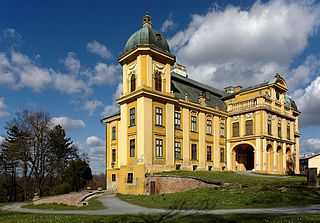
The demographic characteristics of the population of Croatia are known through censuses, normally conducted in ten-year intervals and analysed by various statistical bureaus since the 1850s. The Croatian Bureau of Statistics has performed this task since the 1990s. The latest census in Croatia was performed in April 2011. The permanent population of Croatia at the 2011 census had reached 4.29 million. The population density is 75.8 inhabitants per square kilometre, and the overall life expectancy in Croatia at birth was 78 years in 2012. The population rose steadily from 2.1 million in 1857 until 1991, when it peaked at 4.7 million. Since 1991, Croatia's death rate has continuously exceeded its birth rate; the natural growth rate of the population is negative. Croatia is in the fourth or fifth stage of the demographic transition. In terms of age structure, the population is dominated by the 15‑ to 64‑year‑old segment. The median age of the population is 41.4, and the gender ratio of the total population is 0.93 males per 1 female. The country is projected to lose 350,000 citizens by 2045.

Našice is a town in eastern Croatia, located on the northern slopes of the Krndija mountain in eastern Slavonia, 51 km southwest of regional hub Osijek. Administratively it belongs to Osijek-Baranja County.

Varaždin County is a county in northern Croatia. It is named after its county seat, the city of Varaždin.

Bjelovar-Bilogora County is a county in central Croatia.

Primorje-Gorski Kotar County is a county in western Croatia that includes the Bay of Kvarner, the surrounding Northern Croatian Littoral, and the mountainous region of Gorski kotar. Its center is Rijeka. The county's population was 315,000 in the 2018 census.

Lika-Senj County is a county in Croatia that includes most of the Lika region and some northern coastline of the Adriatic near the town of Senj, including the northern part of the Pag island. Its center is Gospić.

Šibenik-Knin County is a county in southern Croatia, located in the north-central part of Dalmatia. The biggest city in the county is Šibenik, which also serves as county seat. Other notable towns in the county are Knin, Drniš and Skradin.

Virovitica-Podravina County is a northern Slavonian county in Croatia. Its county seat is in Virovitica and it includes the area around the Drava river, hence the name Podravina. Other notable towns are Slatina and Orahovica.

Požega-Slavonia County is a Croatian county in western Slavonia. Its capital is Požega. Population: 78,034 .\

Brod-Posavina County is the southern Slavonian county in Croatia. Its center is the city of Slavonski Brod and it spreads along the left bank of the Sava river, hence the name Posavina. Other notable towns include Nova Gradiška.

Ploče is a town and a notable seaport in the Dubrovnik-Neretva County of Croatia.

Donji Miholjac is a town and municipality in the Slavonia region of Croatia, on the river Drava and the border with Hungary.

Pakrac is a town in western Slavonia, Croatia, population 4,842, total municipality population 8,460. Pakrac is located on the road and railroad connecting the regions of Posavina and Podravina.
Nicholas of Modruš, born in Boka Kotorska, was a bishop of Modruš in Lika, the Pope's representative at the courts of King Stephen Tomašević of Bosnia and King Matthias Corvinus of Hungary (1463–1464). His huge library was left to the newly founded Vatican library. In 1478/79, he wrote a treatise in defence of the Glagolitic alphabet which he sent from Rome to the Modruš bishopric. It is regarded to be the first polemic treatise in the history of Croatian literature, and it was written in the Glagolitic Script. Buried in the church of Santa Maria del Popolo in Rome.

Šodolovci is a village and a municipality in Osijek-Baranja County in eastern Croatia. In 7 villages of the Šodolovci Municipality there was 1,653 inhabitants at the time of 2011 Census.

Nikola is a given name which, like Nicholas, is a version of the Greek Nikolaos (Νικόλαος). It is common as a masculine given name in the South Slavic countries, while in West Slavic countries it is primarily found as a feminine given name. There is a wide variety of male diminutives of the name, examples including: Niko, Nikolica, Nikolče, Nikša, Nikica, Nikulitsa, Nino, Kole, Kolyo, Kolyu.

Goričan is a municipality in Međimurje County, Croatia.

Zvečaj is a medieval ruined castle located on the left bank of the Mrežnica river in modern Karlovac county, Croatia. Around it formed an eponymous village, today separated into upper and lower. It has a rectangular floorplan, with a central tower. It survived in good condition much longer than most castles in the region.




















